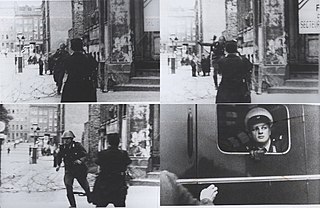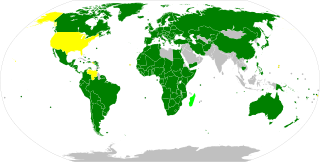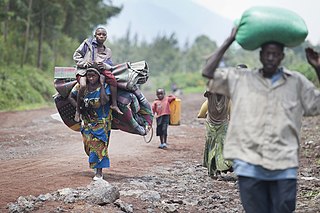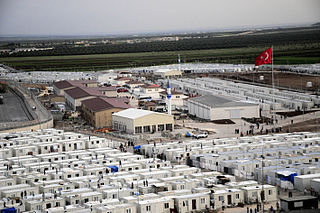
The United Nations High Commissioner for Refugees (UNHCR) is a UN agency mandated to aid and protect refugees, forcibly displaced communities, and stateless people, and to assist in their voluntary repatriation, local integration or resettlement to a third country. It is headquartered in Geneva, Switzerland, with over 17,300 staff working in 135 countries.

The International Organization for Migration (IOM) is a United Nations agency that provides services and advice concerning migration to governments and migrants, including internally displaced persons, refugees, and migrant workers.

A refugee, generally speaking, is a displaced person who has crossed national boundaries and who cannot or is unwilling to return home due to well-founded fear of persecution. Such a person may be called an asylum seeker until granted refugee status by the contracting state or the United Nations High Commissioner for Refugees (UNHCR) if they formally make a claim for asylum. The lead international agency coordinating refugee protection is the United Nations Office of the UNHCR. The United Nations has a second office for refugees, the United Nations Relief and Works Agency (UNRWA), which is solely responsible for supporting the large majority of Palestinian refugees.

An internally displaced person (IDP) is someone who is forced to leave their home but who remains within their country's borders. They are often referred to as refugees, although they do not fall within the legal definitions of a refugee.

A refugee camp is a temporary settlement built to receive refugees and people in refugee-like situations. Refugee camps usually accommodate displaced people who have fled their home country, but camps are also made for internally displaced people. Usually, refugees seek asylum after they have escaped war in their home countries, but some camps also house environmental and economic migrants. Camps with over a hundred thousand people are common, but as of 2012, the average-sized camp housed around 11,400. They are usually built and run by a government, the United Nations, international organizations, or non-governmental organization. Unofficial refugee camps, such as Idomeni in Greece or the Calais jungle in France, are where refugees are largely left without support of governments or international organizations.
The International law bearing on issues of Arab–Israeli conflict, which became a major arena of regional and international tension since the birth of Israel in 1948, resulting in several disputes between a number of Arab countries and Israel.

The UNHCR Nansen Refugee Award is awarded annually by the United Nations High Commissioner for Refugees (UNHCR) to an individual, group, or organization in recognition of outstanding service to the cause of refugees, displaced or stateless people. It was established in 1954.

The Convention Relating to the Status of Refugees, also known as the 1951 Refugee Convention or the Geneva Convention of 28 July 1951, is a United Nations multilateral treaty that defines who a refugee is, and sets out the rights of individuals who are granted asylum and the responsibilities of nations that grant asylum. The Convention also sets out which people do not qualify as refugees, such as war criminals. The Convention also provides for some visa-free travel for holders of refugee travel documents issued under the convention.

Danish Refugee Council (DRC) is a private Danish humanitarian nonprofit organization, founded in 1956. It serves as an umbrella organization for 33 member organizations.

World Refugee Day is an international day organised every year on 20 June by the United Nations. It is designed to celebrate and honour refugees from around the world. The day was first established on 20 June 2001, in recognition of the 50th anniversary of the 1951 Convention Relating to the Status of Refugees.

The Norwegian Refugee Council is a humanitarian, non-governmental organisation that protects the rights of people affected by displacement. This includes refugees and internally displaced persons who are forced to flee their homes as a result of conflict, human rights violations and acute violence, as well as climate change and natural disasters.
Nicolas Bwakira was a Burundian diplomat, international civil servant and pan-africanist. During his long and exemplary career, Ambassador Nicolas Bwakira took on senior roles and responsibilities at various institutions, including the United Nations High Commission for Refugees (UNHCR), the University of South Africa (UNISA), the African Union, the Institute for Security Studies (ISS) and the Crisis Management Initiative (CMI). Ambassador Bwakira fought the good fight as a pan-Africanist and international civil servant in the service of Africa and its people, especially for those in Namibia, Angola, Somalia and, more recently, the Lake Chad Basin. The quest for peace was his lifelong passion. From the time of his posting in Angola in 1976, he developed a special connection with southern African countries, among which Namibia. From 1976 to 1990, Namibian refugees and Namibia’s independence featured prominently in his professional career. In his role as Coordinator for the return of Namibian exiles, he was instrumental in negotiating a total blanket amnesty with the apartheid government as a condition for the return of Namibian exiles. Later, as Director for Africa, he negotiated a total blanket amnesty with the apartheid government, as a pre-condition of the return of South African exiles members of liberation movements.
Bo Schack is a Danish lawyer. On 5 January 2010 he was appointed by the United Nations Secretary-General Ban Ki-moon as Deputy Special Representative of the Secretary General in the Central African Republic. This appointment is in addition to the nominations in October 2009 as the United Nations Resident and Humanitarian Coordinator, as well as UNDP Resident Representative in the country. Since 1985 he has been working for United Nations primarily in the humanitarian field.

United Nations Security Council resolution 859, adopted unanimously on 24 August 1993, after recalling all resolutions on the situation in Bosnia and Herzegovina, the council noted that, despite all previous security council resolutions since Resolution 713 (1991), the region was still a scene of hostilities and there was little compliance with previous resolutions, particularly by the Bosnian Serb party.

United Nations Security Council resolution 1239, adopted on 14 May 1999, after recalling resolutions 1160 (1998), 1199 (1998) and 1203 (1998), the Council called for access for the United Nations and other humanitarian personnel operating in Kosovo to other parts of the Federal Republic of Yugoslavia.

The Kampala Convention is a treaty of the African Union (AU) that addresses internal displacement caused by armed conflict, natural disasters and large-scale development projects in Africa.
Sudanese refugees are persons originating from the country of Sudan, but seeking refuge outside the borders of their native country. In recent history, Sudan has been the stage for prolonged conflicts and civil wars, as well as environmental changes, namely desertification. These forces have resulted not only in violence and famine but also the forced migration of large numbers of the Sudanese population, both inside and outside the country's borders. Given the expansive geographic territory of Sudan, and the regional and ethnic tensions and conflicts, much of the forced migration in Sudan has been internal. Yet, these populations are not immune to similar issues that typically accompany refugeedom, including economic hardship and providing themselves and their families with sustenance and basic needs. With the creation of a South Sudanese state, questions surrounding southern Sudanese IDPs may become questions of South Sudanese refugees.

Arnauld Antoine Akodjènou, a native of Benin, is a long-life humanitarian and diplomat, currently serving as Senior Adviser for Africa at the Kofi Annan Foundation specifically working on the Democracy and Electoral Integrity Initiative. Prior to this he served as the Regional Refugee Coordinator and Special Adviser to the High Commissioner for refugees for the South Sudan Situation at the United Nations High Commissioner for Refugees (UNHCR). He has held numerous positions in the United Nations Department of Peace Operations, in Côte d'Ivoire (ONUCI) and Mali (MINUSMA), and as a Deputy Special Representative of UN Secretary General. His career with the UNHCR spans over twenty-five years.

The Geneva II Conference on Syria was a United Nations-backed international peace conference on the future of Syria with the aim of ending the Syrian Civil War, by bringing together the Syrian government and the Syrian opposition to discuss the clear steps towards a transitional government for Syria with full executive powers. The conference took place on 22 January 2014 in Montreux, on 23–31 January 2014 in Geneva (Switzerland), and again on 10–15 February 2014.

Turkey's migrant crisis, sometimes referred to as Turkey's refugee crisis was a period during the 2010s characterized by high numbers of people arriving in Turkey. Turkey received the highest number of registered refugees of any country or territory every year from 2014 to 2019, and had the world's largest refugee population according to the United Nations High Commissioner for Refugees (UNHCR). The majority are refugees of the Syrian Civil War, numbering 3,591,892 as of June 2020. In 2018 the UNHCR reported that Turkey hosted 63.4% of all the "registered Syrian refugees."















